10 Nursing Supplies Every Nurse Needs

Congratulations! You studied hard and now join the ranks of nurses. Yet, behind every dedicated nurse, there is an arsenal of essential nursing supplies that help them perform their vital duties with precision and care.
In this article, we’ll explore the top 10 nursing supplies. But what do nurses need the most? We’ve gone the extra mile to answer this question and put together a list of must-have nurse tools that are as essential as caffeine during a night shift. Here’s what you can’t afford to be without:
Top 10 Vital Nurse Supplies:
- Stethoscope
- Medical-grade scissors
- Clipboard
- Watch
- Portable hand moisturizer
- Penlight
- Compression socks
- Cheat sheets
- Notebook
- Nursing bag
1. Stethoscope
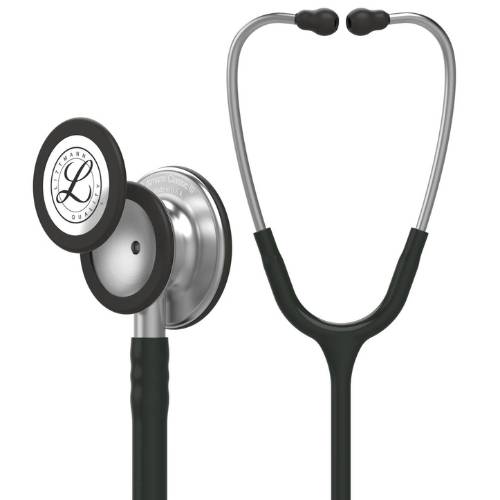
Imagine this common scenario: You walk into a patient’s room, and they say, “Nurse, I feel dizzy.” Your first step? Measure their vital signs. And what happens if you don’t have your stethoscope? You’d have to awkwardly borrow some nurse supplies from a coworker. Save yourself some trouble and have it ready — you’ll use it multiple times a day. Vital signs are called “vital” for a reason.
Besides measuring vital signs, you’ll use this handy device to assess a patient’s heart, lung, and abdominal sounds. This tool is so essential that chances are you already got one when you were shopping for nursing school supplies.
Check out our guide to great stethoscopes to choose from. The most famous is Littmann, known for their tight quality controls that keep things reliable. But if you’re on a budget, there are some other options to explore.
2. Medical-Grade Scissors

There are numerous things that need cutting on a nursing floor: bandages, medical tape, and even fabric if necessary. And let’s not even get started on pill blister packs; those can be a real challenge to open during medication preparation. Having quality scissors on a medical floor is definitely a huge advantage.
Usually, medical scissors come with a protective top, ensuring you don’t accidentally cut the patient while trying to cut tape. Some nurses love the lanyards for quick access, but it’s best to check with your employer. In places like psychiatric units, they might give a thumbs down to nursing supplies that are within easy reach of patients, which can increase the risk of self-harm or harm to others.
Check out our guide to medical scissors.
3. Clipboard
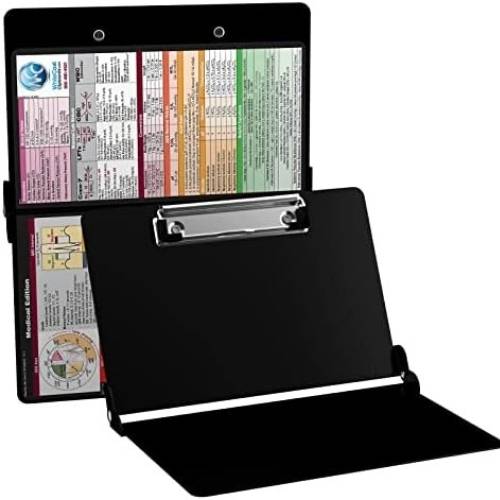
As a nurse, you’ll find yourself doing a lot of writing and typing. Picture this scenario — you walk into a patient’s room, and the previously unconscious patient suddenly wakes up and starts sharing their symptoms for a solid 10 minutes. How do you record all of that info? Do you turn to a coworker to become your living clipboard, jotting notes on their back? To avoid this trouble, stock up on the necessary nursing supplies — such as a clipboard.
Check out our guide to nursing clipboards here.
4. Watch
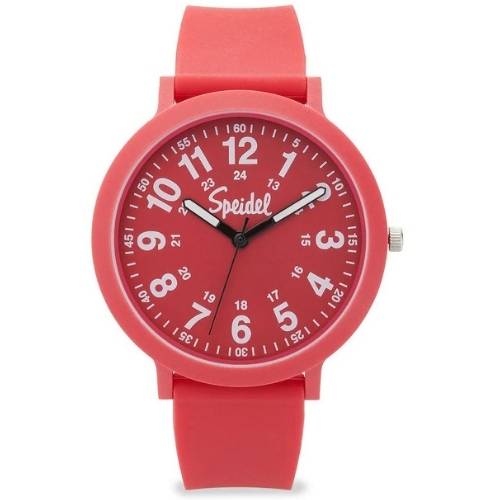
As a nurse, you depend on your watch. How else can you keep track of how many breaths a patient takes in a minute? However, you can’t get by with any watch — you’ll need a nurse watch.
First off, your watch has to be waterproof. Nurses wash their hands as many as 100 times per 12-hour shift, so it’s likely to be splashed a number of times throughout the day. It should also be easy to clean and have the ability to light up at night, in case you need to count respirations while your patient is sleeping.
In terms of preferred nurse accessories, for some professionals, fob watches outperform wristwatches. These watches are worn on a lanyard or clipped to the uniform and offer quick time checks. Furthermore, their easy-to-clean design promotes hygiene in healthcare settings. Meanwhile, some nurses prefer smartwatches. In this sea of ticking possibilities, choose what works best for you.
Check out our guide to nurse watches.
5. Portable Hand Moisturizer
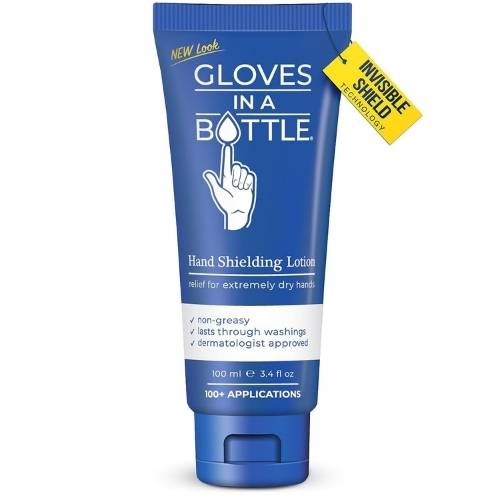
Hand washing and the use of hand sanitizers are important interventions in stopping the spread of viruses and bacteria. But do you know how it affects your skin? Constant hand washing and sanitizing can cause irritation, dryness, and dermatitis. It’s painful, uncomfortable, and, most importantly, can be avoided with proper skin care. So, invest in a good hand moisturizer— it’s a great addition to your nursing supplies list.
6. Penlight

A penlight is a compact, portable flashlight that looks like a pen. Its primary use is to assess patients’ pupils for their response to light. Additionally, penlights come in handy for examining the oral cavity, throat, and ears, or inspecting wounds and injuries. These devices provide healthcare professionals with a portable and convenient light source for precise assessments. Given that nurses perform daily head-to-toe assessments, a good penlight is a valuable addition to their nurse supplies must-haves.
7. Compression Socks
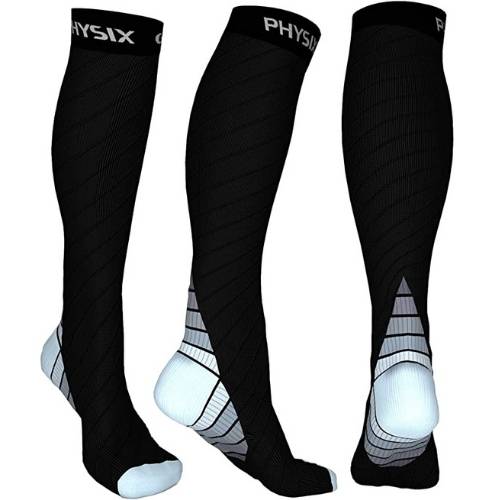
We know what you’re thinking — unattractive, goofy, and old-school. But hey, nurses and healthcare professionals are on their feet for extended periods of time, often 12 hours. Ever thought about the toll it takes on your feet and legs?
This means that — in addition to great nurse shoes — a pair of compression socks are your trusted allies during those long shifts. They are made of elastic fibers that are tight at your feet and get a bit looser as they go up to your knees. They help counteract fluid build-up and gently push the fluid back toward your heart, preventing varicose veins. So, save yourself a doctor’s visit and make proper use of this leg-saving nurse supply. Give your legs and your heart the self-care they deserve and wear compression socks.
Check out our guide to compression socks.
8. Cheat Sheets
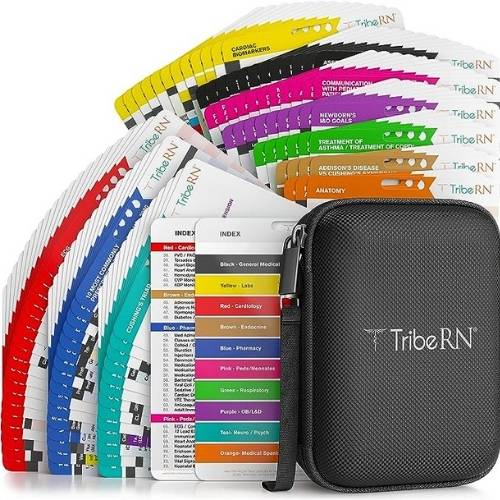
Let’s be real, you’re only human, and you can forget things. Luckily, you have nursing supplies to address just that. It can be handy to keep essential info within reach in case fatigue or distractions mess with your memory. For instance, if you’re in cardiology, an EKG cheat sheet can be a lifesaver, helping you spot arrhythmias, ischemia, and other heart issues. There are cheat sheets for sale for every specialty. Grab one or make one so you’re less likely to forget what truly matters.
9. Notebook
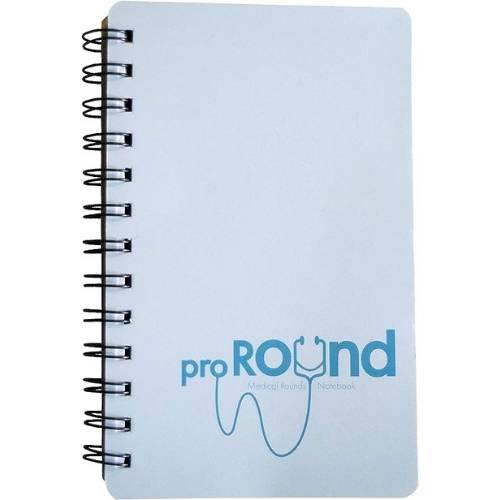
As a nurse, learning never stops. Each day brings opportunities to discover something new. Given that repetition is the mother of learning, it’s important to cultivate the practice of noting down valuable insights and keeping them at your fingertips in your nursing notebook. Who knows, maybe down the road, you’ll compile them into a bestselling book of nursing tips.
10. Nursing bag
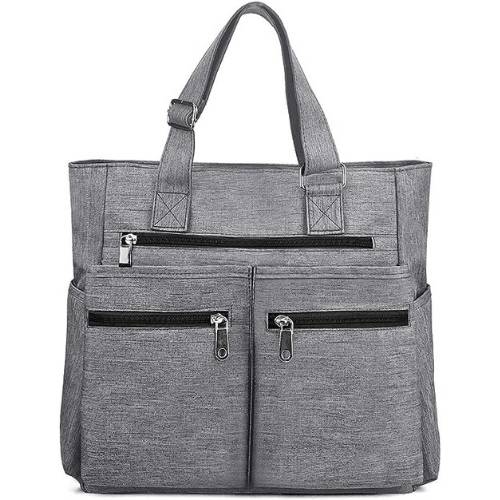
Now that we’ve answered, What do nurses need in their arsenal of supplies, it’s time to talk about organization. A nurse bag with multiple compartments will help to keep your tools in order. Just picture yourself in an emergency, struggling to untangle a twisted stethoscope wire that’s snared in your lucky scarf. Nightmare, right? So save yourself the trouble and keep things organized with a nursing bag.
Check out our guide to nurse bags and nurse fanny packs for more information.
Nurse Supplies: Adapting to Unique Needs
In summary, nursing supplies serve as your reliable companions in the healthcare world. Every nurse’s toolkit can be unique, and you can customize it as you gain experience. Depending on where you work, you might also need extra tools such as a pulse oximeter, a thermometer, and a sphygmomanometer (a fancy term for the blood pressure cuff). To avoid buying unnecessary items, check with your employer about what they provide at your workplace.
Got Nursing Supplies? Time To Find a Job You Love
Now as you have assembled all the necessary equipment, you are ready to start looking for exciting work opportunities. Need help finding work you love? Learn how IntelyCare can match you with nursing jobs that would be a great fit.
